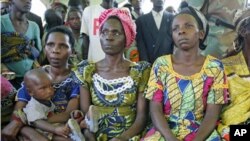Authors of a U.S. report released this week [Thursday, May 12] revealing a very high number of rapes in the Democratic Republic of Congo are defending their work after criticism from advocates, U.N. officials and other researchers.
Congolese women's advocate, American author Eve Ensler was one of many who reacted strongly to the new report. In a blog posting that was widely discussed in social media, she asked "who needs another report?". She also asked, in her words, "why should people waste precious time when we know the facts, and have known the facts for over 13 years?"
U.N. officials have called Congo the rape capital of the world. The numbers of the new report indicate that during the study's one-year time frame, between 2006 and 2007, the number of rape victims was estimated at 400,000, or 26 times higher than what the United Nations has been reporting.
One of the study's authors, Tia Palermo, from Stony Brook University, said that was one of the reasons the research was conducted.
"We knew that the estimates were implausibly low. The U.N. estimates, the 15,000 that is generally quoted in the media and reports, comes from reports to U.N. of sexual violence and rapes that can be substantiated," said Palermo. "So this relies on people coming forward to report sexual violence and that is why our numbers differ. We are not saying they are incorrect because their numbers are what has been reported. It is just based on reports, whereas ours is a population-based sample where we go into the households and ask all women in their households in private their experience with sexual violence, so they are very different methodologies."
The lead author of the study, Amber Peterman, from the International Food Policy Research Institute, said even their own higher numbers are underreporting the tragedy. The study was conducted only with women of reproductive age, excluding older women, girls and even men who also have been raped.
Peterman also said stigma, shame and fear preclude many women from reporting rapes even when they are asked. The study also revealed a very high percentage, over 22 percent, of women reporting being victimized by domestic sexual violence.
Results were extrapolated from a group of 3,400 interviewed women.
Previous reports also indicated rapes were being committed at alarming levels not only by roving bands of competing armed groups, but also by husbands and boyfriends amid a near total collapse of state institutions.
A U.N. official dealing with sexual violence, Beatrix Attinger Colijn, was quoted as saying the numbers in the new report were not reliable because they were too old, and they did not take into account local factors. She also said the study was limited.
But the authors of the study defended themselves against this type of criticism, saying methods they used were consistent with those used by leading research agencies to assess HIV and infant mortality rates around the world. They also said that unlike most reports about sexual violence in the Congo, their study was nationwide, and not just focused on the conflict-wracked east.
Palermo said continually updated knowledge about the crisis is important. "We do not think that any one study on the subject should be the final word and we encourage people to consider our study along with others, such as those conducted by the Harvard Humanitarian Institute and a recent study in the Journal of American Medical Association published back in August of last year," she said.
As for the release of results four years after the study was conducted, Palermo said that was not an unusual period to go from data collection, to availability, analysis and publication.
The director of the Harvard Humanitarian Initiative, Michael VanRooyen, also expressed reservations about the sampling methods, but he was quoted as saying the important message remains, and other advocates said it had been reinforced with the study, that in Congo what they call a war against women is taking place.
Authors Defend New Report on Congo's Rapes




